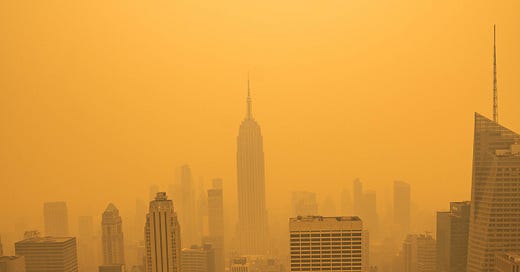How do you cope with extreme heat and bad air?
Let’s crowdsource some wisdom on taking precautions (or not) and living a full life this summer.

Welcome! This is The Heart Dialogues, a free newsletter for people born with heart conditions (and the people who care about them). Join this community by adding your email below. Every other week, you’ll get candid conversations, essays, links, recommendations and other good stuff about living with a wonky heart.
Between extreme heat waves and dangerous air quality levels, this has been a brutal summer. June was the world’s hottest month on record, and July is on track to be even more sweltering. In the southwestern U.S., streets are so hot that people are getting serious burns just from touching them, according to this bonkers Wall Street Journal story. Wildfires in Canada have driven smoky, hazy air to swaths of the U.S. In early June, an apocalyptic orange darkened the skies in New York, where I live, and my neighborhood smelled like a campfire.
As a kid in Canada, I remember winter as the season when you had to spend more time indoors. You checked the weather report each morning; you dressed and acted accordingly. This summer, the opposite has been true. I open my weather app for heat advisories and consult the air-quality index on airnow.gov, gauging what activities I’ll be able to do outside. I get out of breath more easily on those hot, humid days.
People with heart disease are more vulnerable to both extreme heat and bad air. Heat makes your heart work harder; the risk of strokes and heart attacks increase. The EPA recommends that “sensitive groups,” including people with heart disease, keep outdoor activities short and avoid strenuous outdoor activities when the AQI hits 101 to 150. (Above 150, the AQI is unhealthy for all groups.)
But what does that mean for people with congenital heart conditions, as opposed to acquired heart disease?
If I’m not at an increased risk for a heart attack, does that mean I’m good? Conversely, if my oxygen levels are lower than a “healthy” adult’s, should I be more careful?
Does the risk affect people with certain congenital heart issues, e.g. single-ventricle defects, more than others?
What about the potential for lasting damage?
And, crucially, what steps should I be taking? How cautious do I need to be?
Not for the first time, solid information for people born with heart issues is hard to come by. I reached out to a well-known medical clinic with a large adult-congenital cardiology practice, and a media contact there ultimately told me no one had much data or research for a conversation. Indeed, much of the research on air quality or extreme heat and congenital heart defects that I could find focuses on whether either one causes CHDs (like, in the womb). I know I could have kept trying to find answers, but instead I wanted to turn to you, dear readers.
Let’s crowdsource some wisdom.
If you’re in an area that has experienced extreme heat or unhealthy air (or both!), tell us:
How does extreme heat or bad air quality affect you, if at all?
What precautions are you taking, if any? What activities or habits have you changed, if any?
What are your best tips for living a full life amid extreme summer weather?
And if you’re a CHD healthcare provider or researcher who has some thoughts, please get in touch! I know this isn’t an exhaustive look at the issue, and I welcome any expert opinions.
Leave a comment by tapping the button below, or send me a note at theheartdialogues@substack.com.





This was a very interesting article. I grew up in Texas where the heat is extreme for months. I always hated the summers. The heat would last forever and it didn’t cool down much in the evening. I seemed to get a lot of headaches and tire easily in the summers when I spent time outdoors. I always wondered if the heat affected me worse than others. Reading this article has convinced me that it does!
At my age now I choose to do my outdoor activities in the early morning or early evening. We moved from from TX to TN in 2011. The summers are hot but rarely hits 100 degrees and it cools down in the evenings.
My best tip for living a full life in extreme heat is, STAY INDOORS and turn the AC to a comfortable temperature.😂